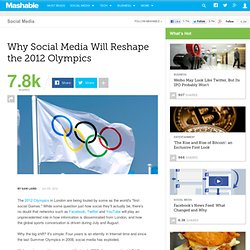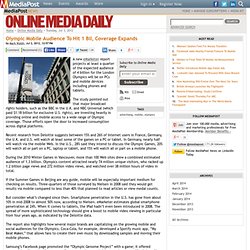

This is for everyone – #London2012. 2012 Olympics: The Social Media Winners [INFOGRAPHIC] For months leading up to the 2012 Olympics in London, the event was hyped as the "world's first social Games.
![2012 Olympics: The Social Media Winners [INFOGRAPHIC]](http://cdn.pearltrees.com/s/pic/th/olympics-winners-infographic-36791566)
" Now that the Olympics and all their athletic glory have finally passed after 17 exciting days, which athletes and events captured most of the social conversation? Jamaican sprinter Usain Bolt was the big winner, with more than 960,000 mentions during the Games. American swimmer Michael Phelps took social silver with over 830,000 mentions. British diver Tom Daley was the third-most buzzed about athlete, with close to 490,000 mentions — partially, no doubt, the result of a widely publicized incident in which he outed a hateful troll on Twitter.
Among sports, soccer sparked the most chatter, followed by basketball and volleyball. These stats all come to us via the social media monitoring platform Salesforce Radian6. Thumbnail image courtesy of iStockphoto, PeskyMonkey. BBC: 12 Million People Watched Olympics on Mobile Devices. Eurosport and Other EBU Members Enjoy Olympics Spike Across TV and Online Platforms. Why Social Media Will Reshape the 2012 Olympics. The 2012 Olympics in London are being touted by some as the world's "first social Games.

" While some question just how social they'll actually be, there's no doubt that networks such as Facebook, Twitter and YouTube will play an unprecedented role in how information is disseminated from London, and how the global sports conversation is driven during July and August. Why the big shift? It's simple: Four years is an eternity in Internet time and since the last Summer Olympics in 2008, social media has exploded. Web use in general has grown rapidly, too. In 2008, there were about 1.5 billion Internet users globally, according to the International Telecommunications Union, making up about 23% of the world's total population. Summer Olympics feature some of the most popular international sports — including soccer, basketball, swimming, and track and field — so that's sure to fuel the global buzz as well.
Facebook Twitter YouTube What It All Means Thumbnail image via iStockphoto, cmannphoto. How Mobile, Social Will Win the 2012 Olympics [INFOGRAPHIC] Planning to augment your viewing of this summer's London Olympics action with a trusty iPad by your side for stat updates, Twitter chatter and other social interaction?
![How Mobile, Social Will Win the 2012 Olympics [INFOGRAPHIC]](http://cdn.pearltrees.com/s/pic/th/mobile-olympics-infographic-34154324)
Well, thank your lucky pixels — consumer tablets weren't even a thing for the last Summer Olympics, in 2008. Smartphone use hadn't truly taken off back then, either. The increase in mobile technology is sure to have a profound effect on how millions of viewers — and many athletes — experience the 2012 Games. Fans will be able to converse, debate and rave communally as never before because of mobile proliferation and the explosive growth of social media over the past four years. We recently took a look at how Facebook, Twitter and YouTube have grown since 2008, and the findings were pretty incredible. The digital marketing agency iProspect recently looked at social growth too, but expanded the lens to include mobile, coverage and viewership numbers as well. Social Media Is the Message for Olympics. Publications Olympic Mobile Audience To Hit 1 Bil, Coverage Expands 07/03. A new eMarketer report projects at least a quarter of the expected audience of 4 billion for the London Olympics will be on PCs and mobile devices including phones and tablets.

The study pointed out that major broadcast rights holders, such as the BBC in the U.K. and NBC Universal (which paid $1.18 billion for exclusive U.S. rights), are investing heavily in providing online and mobile access to a wide range of Olympic coverage. Those efforts open the door to increased consumption across digital platforms. Recent research from Deloitte suggests between 15% and 26% of Internet users in France, Germany, the U.K. and U.S. will watch at least some of the games on a PC or tablet.
In Germany, nearly half will watch via the mobile Web. In the U.S., 28% said they intend to discuss the Olympic Games, 20% will watch all or part on a PC, laptop or tablet, and 15% will watch all or part on a mobile phone.